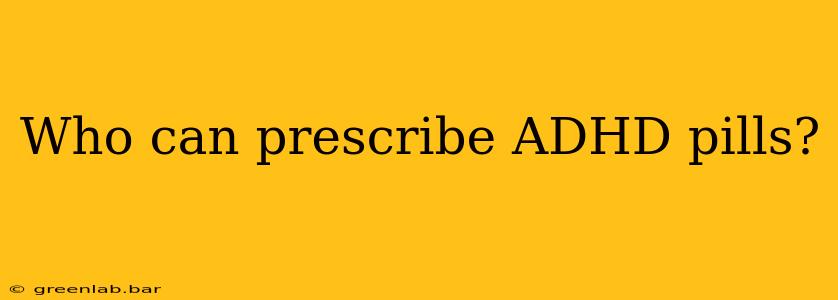Attention-Deficit/Hyperactivity Disorder (ADHD) is a neurodevelopmental condition affecting millions worldwide. Successfully managing ADHD often involves medication, but obtaining it requires navigating a specific healthcare system. This post clarifies who can prescribe ADHD medication and what the process typically entails.
Licensed Medical Professionals Who Can Prescribe ADHD Medication
In most countries, only licensed medical professionals with the appropriate qualifications can prescribe ADHD medication. This generally includes:
-
Psychiatrists: These medical doctors specialize in mental health and are highly experienced in diagnosing and treating ADHD, including prescribing medication. They are often the first choice for individuals seeking ADHD treatment, particularly for complex cases or those requiring comprehensive mental health care.
-
Pediatricians (for children and adolescents): Pediatricians are medical doctors specializing in children's health. Many pediatricians are well-versed in diagnosing and managing ADHD in children and adolescents, and are frequently the first point of contact for families.
-
Family Physicians/General Practitioners (GPs): While not all GPs specialize in ADHD, many have the training and experience to diagnose and treat it, particularly in less complex cases. They may refer patients to specialists if needed.
-
Adult Primary Care Physicians (for adults): Similar to GPs, adult primary care physicians can also prescribe ADHD medication, often after a thorough assessment and potential referral to a specialist.
Important Note: The specific regulations regarding who can prescribe ADHD medication can vary slightly by country and even by state or province within a country. It's crucial to check your local regulations for precise details.
The Process of Obtaining an ADHD Prescription
The process of getting an ADHD prescription typically involves several steps:
1. Comprehensive Evaluation and Diagnosis
A thorough evaluation is essential to determine if you have ADHD. This usually includes:
- Detailed Medical History: The doctor will gather information about your symptoms, family history of ADHD, and overall health.
- Physical Examination: To rule out other medical conditions that might mimic ADHD symptoms.
- Behavioral Assessments: This might involve questionnaires, rating scales, or interviews to assess the presence and severity of ADHD symptoms.
- Neuropsychological Testing (sometimes): In some cases, further testing may be needed to confirm the diagnosis and differentiate ADHD from other conditions.
2. Medication Management and Monitoring
Once a diagnosis is confirmed, the doctor will discuss treatment options, including medication and/or therapy. Medication management typically includes:
- Choosing the Right Medication: Different ADHD medications have varying effects, and the doctor will work with you to find the most suitable one.
- Dosage Adjustments: The initial dose may need adjustments to optimize efficacy and minimize side effects.
- Regular Follow-up Appointments: Regular check-ups are vital to monitor the medication's effectiveness, adjust dosage as needed, and address any side effects.
Finding a Healthcare Provider
Locating a qualified professional who can diagnose and treat ADHD can be done through several avenues:
- Your Primary Care Physician: Start with your current doctor. They can provide a referral or conduct the initial assessment themselves.
- Online Directories: Many online directories list healthcare professionals specializing in ADHD.
- Your Insurance Provider: Check with your insurance company for a list of in-network providers specializing in ADHD.
This information is for educational purposes only and does not constitute medical advice. Always consult with a licensed healthcare professional for accurate diagnosis and treatment of ADHD. Self-medicating can be dangerous and ineffective. The right path to managing ADHD begins with a qualified professional.

